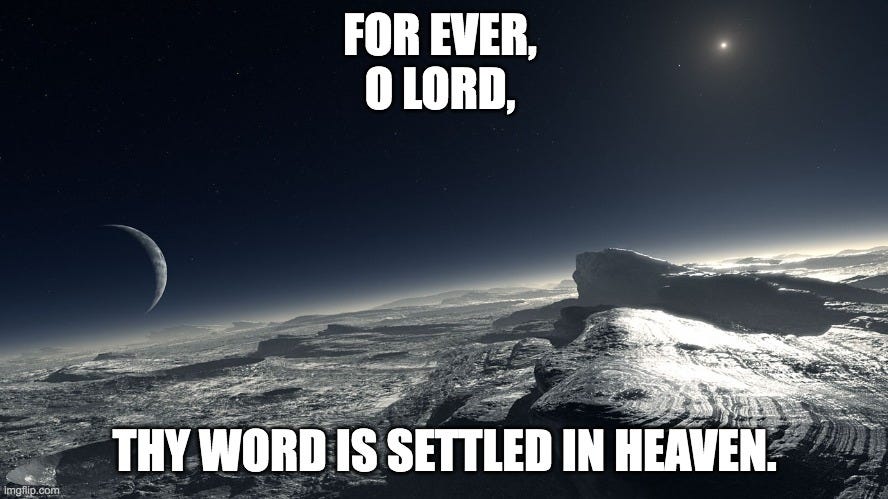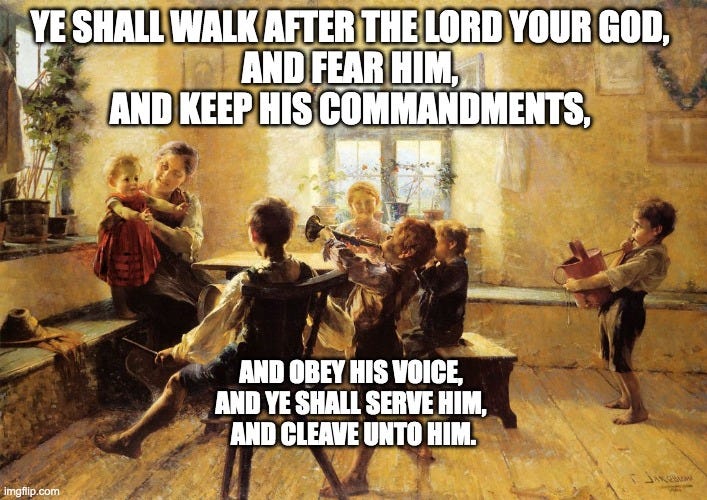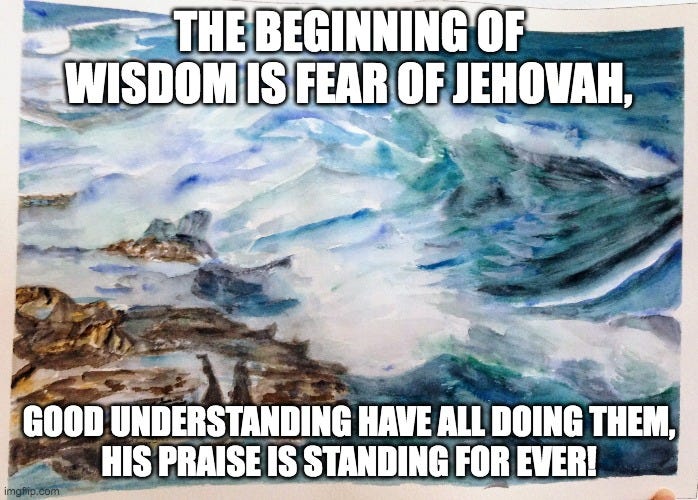Sola Scriptura: The Cannon
One of the issues frequently brought up when discussing the Reformed Doctrine of ‘Sola Scriptura’ is that of the canon. Or, in lay terms, which books we accept as part of Scripture. If Scripture is ‘alone on the top step’, then, the argument goes, ‘how did we come to know what is Scripture’?
Stephen Weller, in his post ‘Sola Scriptura is self-refuting’, makes this case as part of his argument:
-Furthermore, there is no canon of scripture contained in scripture.
—For instance, St John the evangelist did not include at the end of the Book of Revelation a list of books that are to be included in scripture.
—Even if a table of contents this were contained within scripture, it would not entirely solve the problem of how we know that book to be scripture, but it would greatly simplify the problem. We would need some self-standing reason, from within the text itself, as to why one should accept that book. Perhaps it decended from Heaven on stone tablets, or was carved in marble by angels. Yet, no one claims this about any scriptural book.
—We do have scriptures quoted by Christ in the Gospels or by the Apostle Paul in his epistles, so we can by these means determine some of the authoritative books of scripture, but even if this could help us determine scripture, we see in fact that it cannot suffice. Many books in the OT are not cited in the NT. And moreover the book of Enoch, which was uniformally rejected from the canon, is quoted in the book of Jude, which was included in the canon, despite quoting from a non-canonical book. This instance alone excludes internal reference as a possibility for determining the canonical books.
Now, there are a few problems with this case. The first one being, as I pointed out in my earlier post, Scripture itself does not say this. So its a bit weak on the whole ‘self-refuting’ thing. Scripture does not say that Sola Scriptura can only be true if Scripture self-cannonizes. Scripture does not say that the problem of the canon refutes Sola Scriptura.
But I have pounded that horse pretty hard, and its pretty dead, so let’s move on to other issues with this argument:
Ad Infinitum
For what saith the scripture? Abraham believed God, and it was counted unto him for righteousness.
Romans 4:3
The first problem with this argument is (and, yes, I am having fun saying this)… it is self-refuting. The argument, written out in long form, would go like this:
Something can only be authoritative if it stands on its own, and does not need something else to recognize it.
The Scriptures were recognised by the catholic church.
Ergo: The Scriptures are not authoritative.
Now, I probably didn’t put that in the classiest way, but that is the gist of the argument. The problem is, or one problem anyway, is that the argument can’t end there. Cause we arrive at the issue of… who recognized the catholic church?
Which can only have two answers: either the catholic church is self-recognising… ie no one else constituted it. Or it was recognised by someone or something else. Merely pushing the problem back one level.
And then we get to the issue of who recognised that level, and so on, and so on. Ad infinitum.
Recognition vs Reality
Now, while you are pondering that problem, I wish to introduce another: the difference between recognition and reality. Because that difference is one of the most important bits of the New Testament story. John writes:
That was the true Light, which lighteth every man that cometh into the world.
He was in the world, and the world was made by him, and the world knew him not.He came unto his own, and his own received him not.
But as many as received him, to them gave he power to become the sons of God, even to them that believe on his name:
John 1:9-12
He presents four groups. Christ, who came into the world, and was the true light. That was the reality. He was, and is, the true light. Perhaps I should write it ‘True Light’.
The second group was the world. He came into the world, He was (and is) the True Light, but the world did not *recognise* him. The reality was there, but the recognition was missing.
The third group were the Jews. The True Light came amongst them, and they, also, did not recognise him.
And then were those who did recognise him. Not the world as a whole, not the Jews as a group, but a subset. They recognised Him as the True Light.
But, follow me here, He did not become the True Light *because* the recognised him. They did not exercise authority *over* him when the recognised him as the True Light. The truth was there, the reality existed, and they *recognised* it.
So when we look at the issue between the church and the canon, we need to realise that it is perfectly possible that the Scriptures are the word of God in reality, and that what the church did was recognise that reality.
The Holy Spirit
Of which salvation the prophets have enquired and searched diligently, who prophesied of the grace that should come unto you:
Searching what, or what manner of time the Spirit of Christ which was in them did signify, when it testified beforehand the sufferings of Christ, and the glory that should follow.
Unto whom it was revealed, that not unto themselves, but unto us they did minister the things, which are now reported unto you by them that have preached the gospel unto you with the Holy Ghost sent down from heaven; which things the angels desire to look into.
I Peter 1:10-12
And now we come to the Holy Spirit. Because the Reformed answer to the canon issue is… the Holy Spirit. If the catholic church, or the Reformed church, or a bunch of pagans living on a dessert island somewhere who happened to have a Bible float in on a raft in the hands of a dead sailor… recognise it as the inspired Word of God, the authority that moves us to that recognition is… the Holy Spirit.
The protestant position is that the Holy Spirit not only moved the church fathers to accept each individual work of Scripture as Scripture, but that He moves each and every Christian to recognise, understand, and obey the Word of God. That without His work, the Scriptures would just be one more interesting book on the shelf.
Conclusion
LAMED.
For ever, O LORD, thy word is settled in heaven.
Thy faithfulness is unto all generations: thou hast established the earth, and it abideth.
They continue this day according to thine ordinances: for all are thy servants.
Psalm 119:89-91
So, I’m afraid that the issue of the Canon of Scripture does not help advance church authorities to some authoritative role over and above the Holy Scriptures. The Holy Spirit holds such a position, but the church… not so much. Neither church, no church, no church body, no church authority, no austere monk or bejewelled Pope. No one.
The Holy Scriptures are God’s inspired Word to the world, the church, and individual Christians. Their authority is dependent upon no Earthly authority.
—
Thank you for reading Von’s Substack. I would love it if you commented! I love hearing from readers, especially critical comments. I would love to start more letter exchanges, so if there’s a subject you’re interested in, get writing and tag me!
Being ‘restacked’ and mentioned in ‘notes’ is very important for lesser-known stacks so… feel free! I’m semi-retired and write as a ministry (and for fun) so you don’t need to feel guilty you aren’t paying for anything, but if you enjoy my writing (even if you dramatically disagree with it), then restack, please! Or mention me in one of your own posts.
If I don’t write you back it is almost certain that I didn’t see it, so please feel free to comment and link to your post. Or if you just think I would be interested in your post!
If you get lost, check out my ‘Table of Contents’ which I try to keep up to date.
Von also writes as ‘Arthur Yeomans’. Under that name he writes children’s, YA, and adult fiction from a Christian perspective. His books are published by Wise Path Books and include the children’s/YA books:
The Bobtails meet the Preacher’s Kid
and
As well as GK Chesterton’s wonderful book, “What’s Wrong with the World”, for which ‘Arthur’ wrote most of the annotations.
Arthur also has a substack, and a website. On the substack you can listen to some of his published books. Free.
Thanks again, God Bless, Soli Deo gloria,
Von





The table of contents at the front of any Bible are the wise 🔥, Spirit Filled ⛲ decisions and traditions of the Councils of the Church.🕯️🌐⛪
The Holy Scriptures weren't just plopped down from on high like the heresies of the quran and book of mormo, they are the 🕊️Deposit of Faith given to the Church by Grace. They reveal, in historical space/time, God as Trinity and 🩸the LOGOS InCarne. ✨Grace and peace🔔 to you, Christ is RISEN! Σοφία Χάρης Αγάπη Δόξα!🌳